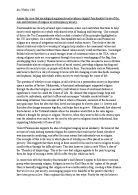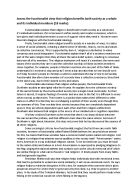Functionalist view about the role of religion in today society
Functionalism is a structural theory, seeing society as a whole with different social institution performing various functions for the benefit of society and the individual. Religion, in functionalist view, exists to promote social order and solidarity.
Functionalists argue that religion plays an essential role in creating value consensus and regulating society. For Durkheim (1915), sacred things, which can evoke deep feelings of awe, fear and wonder, are fundamental in all religions. He claims that sacred symbols unite people of the same religion together. This is because they represent the society collective conscience (shared norms, values and beliefs) which integrates individuals and regulates their behaviour. In addition, Durkheim believes religion also involves shared rituals and practices. Regular religious rituals help to reinforce social integration by reminding believers that they are a part of the society. On the other hand, the study by Malinowsky focuses on the effect of religion on individual basis. Malinowski agrees with Durkheim in that religion performs the function of promoting social solidarity, however not because religion is the worship of society, but because religion responds to the psychological needs of individuals in time of troubles. Religion provides comfort for people to deal with uncertainty and stress. Sharing the same view with the above fundamentalists, Parsons argues that religion performs two positive functions: promoting social integration and answering life's 'eternal questions'. As religion responds to questions like why some people are poor and others are rich, it helps comfort people and preventing the less-blessed ones from protesting by giving them hope of a better after-life. Hence religious beliefs contribute to maintaining social order.








